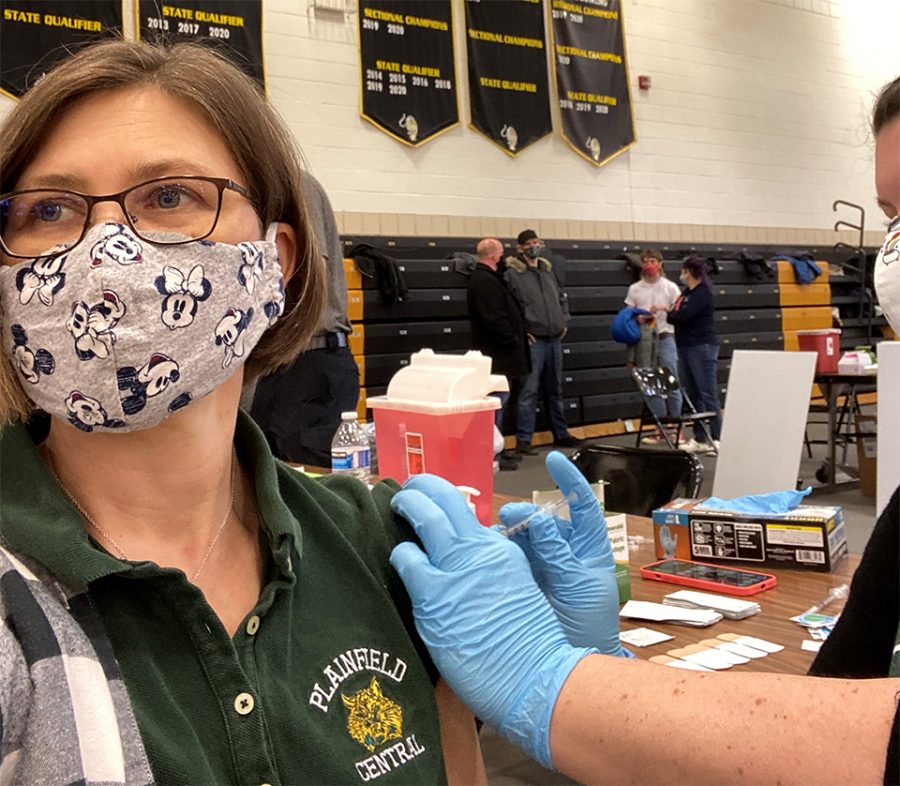COVID vaccine spurs debate: to require yet or not
photo courtesy of Jennifer Rodeck
Jennifer Rodeck, French teacher, receives COVID-19 vaccine at Joliet West
March 24, 2021
A COVID-19 vaccine made by Pfizer-BioNtech was approved for emergency use by the U.S. Food and Drug Administration (FDA) on Dec.11, 2020. This means the FDA made the vaccine available for public health emergency distribution, the vaccine is available outside of research study but has not yet reached full approval. As long as people receiving the vaccine continue to benefit, it will continue towards full FDA approval outside of Emergency Use Authorization (EUA).
Despite medical safety there is a civilian dispute on whether to receive the vaccine or not. People want to get the vaccine for immunization purposes, ease of mind, or to help the statistics, getting 80 percent of the population vaccinated would achieve herd immunity so people could return to a new normal, according to the World Health Organization.
“I like to think a vaccine wouldn’t be released without meticulous planning and caution, but I also understand there are different variants of virus, so the vaccine won’t solve everything,” Kaitlynn Pillion, senior, said.
However, the other side argues that there has not been enough research done yet for them to trust the vaccine being required for people
“In my opinion it is too soon, there is not enough information that’s been provided to me, I don’t knock anybody if they want to get the vaccine, but what I want is more information,” Cole said.
Between both sides there is not much argument of constitutional rights. The government cannot require a shot for everyone until the FDA has given full approval, which could take years.
“In a perfect world yes requiring the vaccine is okay, but I’d have to say no right now because of the type of principle our country is built on,” Alyce Sutherland, senior, said.
Many diseases and vaccines have come and gone; some vaccines have been smooth sailing while others have some rough after-effects. Although a very small chance, about 1 in 2.7 million doses of Polio vaccine can revert to paralysis, according to who.int. Or the flu shot, according to livesciences.com, on rare occasions can cause allergic reactions and high fevers, the opposite effect of its use. The unknown can be scary, and some people just want to wait for more research.
There are also medical concerns with the vaccine. Cole’s doctor recommended that she not receive the Johnson & Johnson vaccine because of a certain medication she was already on because the aftereffect of mixing the two could result in paralysis for her.
“They do not have the FDA approval. After the FDA approves it and says, we’ve given you the greenlight then yes, making it a requirement is fine,” Xiomara Cole, Spanish Teacher, said.
Although District 202 is not requiring the vaccine for staff at the schools, dph.illinois.gov says teachers and educational staff are among the phase 1b priority groups, along with those over 65, to receive the vaccine, right below healthcare workers. This group is defined as frontline workers with higher risks of exposure due to inability to work completely remote and in closer proximity to coworkers or the public.
With more staff getting the vaccine and progression on an under 16 vaccine, superintendent, Lane Abrell, believes there will be a more “normal” return to school in the next 2021-2022 school year, along with summer school similar to this year.
“We plan to return to a full-time schedule to begin the 2021-22 school year. Summer school for 2021 will be in-person, although I anticipate masks will be required for summer school,” said Abrell.
Although not required yet, in the end getting the vaccine is a choice.
“I don’t look down at anyone who does not want to receive the vaccine, but I hope that more research can be done, so that more people will trust the vaccine and we can return to a new normal with more vaccinations,” Pillion said.






